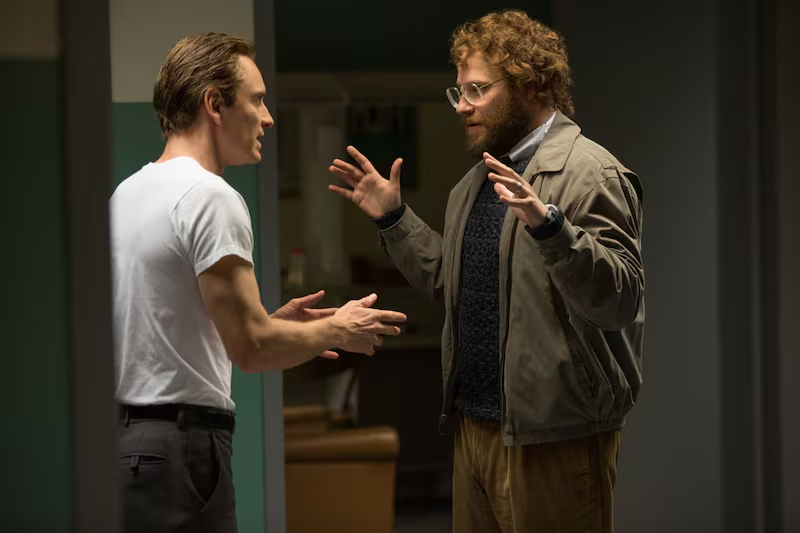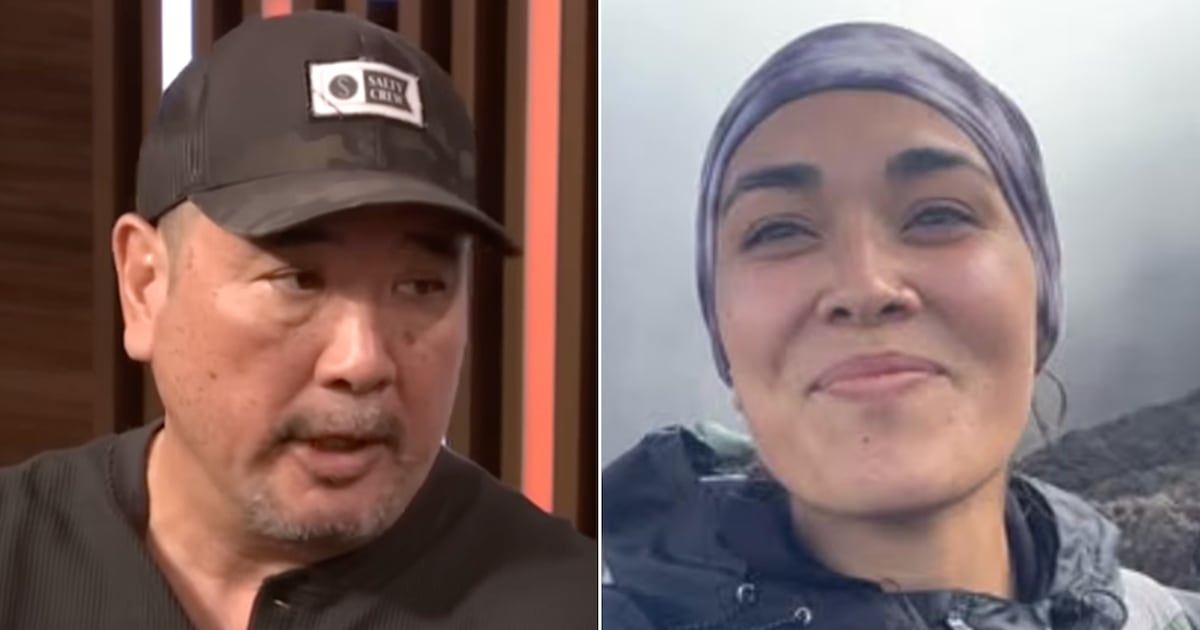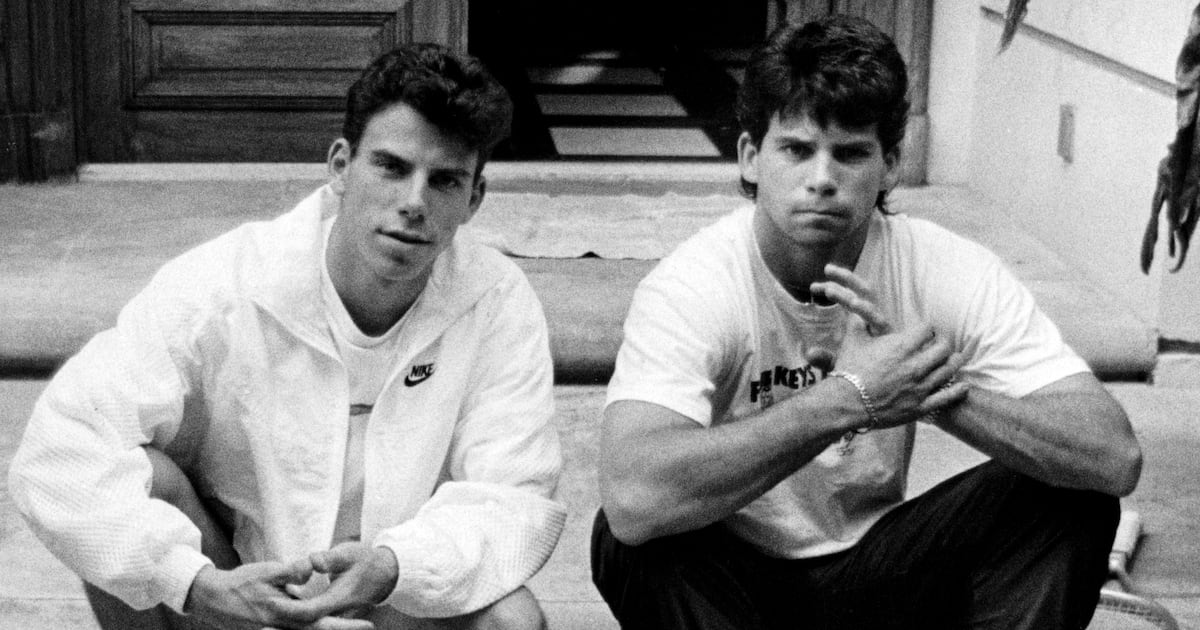It is, without question, the most unmistakable laugh in Hollywood. A guttural uh-huh chuckle—think a bassier Butthead—it comes early and often, punctuating each sentence, effectively eradicating any semblance of tension.
And these days, Seth Rogen has reason to be laughing.
The 33-year-old actor/director has moved past the most trying moment of his professional career in the Kim Jong-un/North Korea satire The Interview, a film that allegedly triggered the hacking of Sony Pictures Entertainment. What followed were threats, theater bans, and light heckling from the commander-in-chief himself.
ADVERTISEMENT
Now that the fog of cyberwar has lifted, Rogen has rebounded with the finest performance of his career—one that has awards pundits speculating about his Oscar chances in mid-October. Yes, his performance as Apple co-founder Steve Wozniak in Jobs is that good. In the film, directed by Danny Boyle from an Aaron Sorkin script, Rogen more than holds his own going mano a mano with Michael Fassbender’s Steve Jobs. It’s a nuanced, finely-calibrated turn that is unlike anything the breezy Canadian’s done before.
Dr. Ben Carson, on the other hand, seems to have lost credibility since retiring from an exemplary career as a neurosurgeon. These days, the GOP presidential candidate has degraded into a delusory rabble-rouser spewing incendiary remarks, like how the Holocaust would have been “greatly diminished” if Jews had guns, or that far-fetched fable about being held up in a Popeye’s.Rogen’s been none too impressed by Carson, and tweeted the following:
“They implied that if their [right-wing] politics were applied to the Holocaust that Jews wouldn’t have been killed,” says a disgusted Rogen. “To me, it wasn’t just about the Holocaust thing. It was about the [Oregon] shooting and how he said that people shouldn’t just stand there and let themselves get shot, and that the correct thing to do if someone has a gun in your back is to point them at someone else and have them go rob that person? I mean, I just read a lot of the stuff this guy was saying and he seemed like someone that I just detested. At face value, what he’s said is absolutely despicable. That guy is totally fuckin’ bonkers.”
Rogen phoned me from Los Angeles, where he’s in town to host a charity bar mitzvah for his old buddy James Franco. Over the course of our talk, we discuss his stellar turn in Jobs, Kanye West, and much, much more.
What was your bar mitzvah like?
It was kind of generic, I guess! It was in the Richmond Country Club, which was a Jewish country club in Vancouver. I probably went to 30 bar mitzvahs there in my life, and mine kind of blends in with those other ones. My mother thought it’d be fun to have square dancing and it was… not fun.
I interviewed Drake once and he said his was in the basement of an Italian restaurant in Toronto.
There you go! I think mine was better than Drake’s! [Laughs]
But this Jobs situation is exciting, man. There’s some serious Oscar talk already. I know you have a longstanding relationship with Sony, is that how you nabbed the role?
I hope that [Oscar talk] becomes a self-fulfilling prophecy! Why not, sure! But actually Aaron Sorkin said that he suggested me for the role. I’d met him a few times before, and he said he just thought I could do it, which is crazy that Aaron Sorkin was thinking about me in any capacity. I came in and auditioned very soon after for Sorkin and Danny [Boyle]—Sorkin read the Steve Jobs part, which was pretty surreal—and they had me do literally every scene I’m in in the whole movie. Christian Bale was attached to it at the time I auditioned. Then I didn’t hear anything for six months, and then I was cast.
For a lot of your comedy films, the script serves as more of a skeleton and bouncing off point for improv, but with a Sorkin script I imagine you’ve gotta stick to it. Did that prove challenging?
Honestly, there was something that was kind of a relief about how you had to just say it, and that’s what it is, and if you don’t know how to say something then you talk about it and dive into the psychology of it. That was the actor-y process that I hadn’t been privy to, asking, What does this line mean? and spending hours and hours dissecting the dialogue. We don’t do that because we don’t favor that structured-joke style of comedy.
You did a great job hosting the Independent Spirit Awards a few years back, but if I remember correctly, you told a lot of funny Michael Fassbender dick jokes because Shame was out that year. Was it awkward when you guys met? Was he all, “I heard that!”
There were a few good Michael Fassbender dick jokes in there! [Laughs] I’d met him a few times before. It’s funny. They were filming 12 Years a Slave in New Orleans at the same time that we were filming This Is the End, and for whatever reason—they probably wanted to blow off some steam—we were throwing parties a lot at bars because New Orleans is an easy place to do that, and so they would come and hang out with us quite a bit. I think the whole cast came to our wrap party when we finished shooting. Steve McQueen would come hang out. It was very bizarre. We concluded that they were so deeply entrenched in something that was such a bummer to shoot that it was probably fun to hang out with these other people that were not.
They probably needed the drinks.
Yeah, definitely. So we hung out a few times and he’s actually really funny. As an actor he takes his work very seriously, but as a human, he doesn’t take himself very seriously. He has a very good sense of humor and he’s someone that I would be actual friends with in my life, it feels like. So he was not appalled by my giant dick jokes.
So wait—who was the MVP of the This Is the End / 12 Years a Slave New Orleans partying?
We would go pretty hard! I was gonna say it’s illicit, but almost everything is allowed in New Orleans. It’s honestly a little foggy. But Fassbender came to our set a few times also. I think him and Craig Robinson were staying in the same hotel and they became friends. They would play pool together. So Craig started to bring him by our set, basically. And I distinctly remember being really drunk in a bar in New Orleans and us talking about how much fun it would be to work together someday, and I never thought it would actually happen.

Jobs raises an interesting question, which is: Are all geniuses assholes? In other words, do they have to be inherently noncompliant with society’s rules in order to accomplish all that they do?
I think there’s a difference between jiving with the rules and being an asshole. In my experience, I’ve worked with a lot of people whom I’d consider incredibly brilliant in their fields, and a lot of them are people I’ve heard are very difficult to work with, but I have never found any of them difficult to work with. From my perspective, the more talented a person is, the better they are to work with. But that being said, I’ve never worked with anyone on the scale of how Steve Jobs has affected our culture as we know it.
Well you do know Kanye, who’s called himself this generation’s Steve Jobs.
And I’ve had very pleasant experiences with Kanye West, honestly! He rapped me his entire new album in the back of a car. He was playing it on his laptop. I found him to be incredibly nice.
Now that you’ve had a little time to digest The Interview insanity, I’ve worked on some pieces looking into the Sony hack, and to me—as well as a lot of cybersecurity experts—it seems like there’s no way it was North Korea who was behind it, and they were merely convenient scapegoats.
Yeah. The dude who came to my house and did my cybersecurity, who I think used to work at NASA, said he didn’t think it was North Korea. And I’m not generally one to trust the government, so them implying that it’s North Korea doesn’t really ease [things]. But I honestly have no fucking clue. We still talk about it, me and Evan [Goldberg], and sometimes we say, “It must have been the North Koreans,” and other days we say, “There’s no fucking way it was the North Koreans.” I really don’t know, which is one of the weirdest parts of the whole thing. We’ll probably never know.
You’re part of a rarefied group of people—along with Matt Damon—who have been called out by President Obama on national TV. How surreal was that?
He was way nicer to me than Matt Damon! [Laughs] That was for sure a surreal moment. It really showed that it had gone to the most extreme place that it possibly could have gone! We were in shock. I was sitting in my office with everyone that we worked with watching it on national television and we were like, “What the FUCK is happening right now?” I mean, it was totally surreal. It was not our best-received movie critically, and there were so many stories about it by the time it was reviewed, so how do you even review that movie objectively? But as time has gone on, I’ve grown to feel very creatively validated by the impact that it had.

Right. There were people ballooning copies over the border into North Korea.
Yeah! You can debate till the cows come home whether it’s funny that I’m sticking a rocket up my ass, but what is hard to debate is that it had an actual impact, and when you’re an artist, that’s your goal—to get a reaction from people. As time has gone by, that’s something that I’ve grown to appreciate. It was one of the most stressful things I’ve ever had to deal with, and some of the vitriol that was thrown at it was tough to deal with, but as the dust has settled I’m honestly very proud of what we did, I stand by what we did, and I honestly wouldn’t do anything different. I’d take out maybe three ass jokes.
You’re filming Neighbors 2 now in Atlanta. Can you tease a bit what that’s about? I’m assuming Selena Gomez and Chloe Moretz play the sorority girls.
Kind of. It’s tough with sequels, that’s what I learned. The only reason we thought of doing one is the emotional story. Plot-wise, yes, there’s a sorority and a lot is happening, but we’ve realized that the first one worked because there’s an emotional story at its core which is when you have kids you don’t want to stop doing the things you did when you were younger. It’s largely just the next thing that happens, that your kids start to get older and you realize that they’ll start to fuckin’ hate you, and you long for the days when they were just a baby.
What about Pineapple Express 2? There was a lot of talk about that happening, and the movie’s gained such a huge cult following.
I think I read the email in the [Sony] hack where they decided not to do it, though! [Laughs] Judd was trying pretty hard to do it, but you can read the exact correspondence that led to the demise of that film! They essentially wanted us to make it for the same amount of money that we made the first one for, and when you’re making a movie with action in it, it’s very, very difficult to do.
Plus all the actors had leveled-up in salary since then, too.
Yeah, and that wasn’t even a big element of it to us! I’ve never made a movie for my own personal salary. And we’ve almost never not made a movie for that reason; there are very few movies that we’ve abandoned for money reasons. If anything, the studio won’t make it for the amount that we need to literally make the script that we wrote, and that’s what it seemed like was happening. Their enthusiasm didn’t match what we thought we needed to make it a gratifying experience cinematically.
Let’s bring it back to Jobs. Where do you fall on Steve Jobs? The film ends on a fairly sentimental note, but all the foreplay is Jobs being this cutthroat mercenary character and denying paternity of his daughter.
I knew nothing about Jobs going into the movie, and I put no thought into him. It just wasn’t something that I cared that much about, honestly. And when I read the script is when I was intrigued by how conscious the attempt to revolutionize the world was. The ambition of it, and the unapologetic ambition of it, is what struck me the most. A lot of people are ashamed of their ambitions, and a lot of people’s ambitions aren’t as big as changing the way human beings interact with one another. That’s what I was so impressed by, was these people were so unapologetically ambitious with goals that were so unprecedented, and there was no reason to believe that they were realistic in any way, shape, or form. And when you view his products as his art, it makes me realize why he may have been so aggressive about controlling them. I don’t want to say it justifies that behavior, but it makes me really understand that behavior, because I’ve dumped myself into something and when it seems like someone else might be ruining that thing, you want to fucking stop it at all costs.
I also usually reserve judgment until meeting people, but in Ben Carson’s case, I concluded what I concluded and that was a confident swing, I think!





